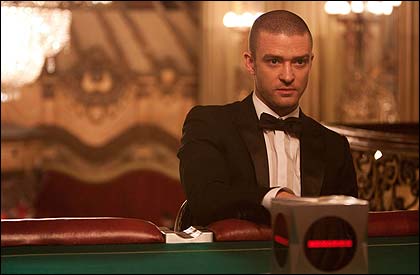
Time is Money
Parallels abound in Niccol’s new film
IN TIME: Written and directed by Andrew Niccol. Cinematography, Roger Deakins. Editor, Zach Staenberg. Music, Craig Armstrong. Starring Justin Timberlake, Amanda Seyfried, Cillian Murphy and Vincent Kartheiser. 20th Century Fox, 2011. PG-13. 109 minutes. Three stars.
 |
Dystopian, muddled and lovely, In Time is clearly writer-director Andrew Niccol’s follow-up to Gattaca, another pretty film about the way enforced distinctions among people limit human potential. (Between the two films, Niccol also directed S1m0ne and Lord of War.) But where Gattaca starred a trio of attractive young actors capable of a relative level of seriousness, In Time stars Justin Timberlake and Amanda Seyfried, who stare out from the film’s poster with looks that approximate but never quite reach intensity. It’s a telling image for the film, which wraps a good idea around a sometimes flimsy plot and is all in all too much for its stars to carry.
In Time’s premise floats on familiar phrases made literal: “I don’t have enough time.” “Living paycheck to paycheck.” “Time is money.” Time is money, in Niccol’s future. Humans are engineered to age normally until 25, at which point the aging process stops and a little green ticker on your arm kicks into life, counting backwards. You get a year to start. You have to earn (or inherit) whatever else you hope to live on. This is all very familiar, except that when your bank account hits zero, you don’t generally immediately keel over in the street.
In the downtrodden “time zone” where Will Salas (Timberlake) lives, people live hour to hour, their clocks ticking down inorexably with every bus ride, every meal, every cup of coffee. Menial jobs earn too few minutes, and prices go up seemingly arbitrarily. Youth and beauty only go so far.
Will’s life changes when he rescues a very rich man from the Minutemen, bullies who steal time from the unwary. The rich feller, who was blatantly displaying his copious time in a dive bar, wants to end his unnaturally long life. Before he does so, he transfers his remaining century to Will. The sudden transfer of time catches the attention of Timekeeper Raymond Leon (Cillian Murphy, who really doesn’t look 25), who believes Will is a thief. Murphy seems to know what kind of film he’s in; his character, embodying the mishandled power of the system, becomes surprisingly sympathetic.
With decades at his disposal, Will learns how the other half lives. In wealthy New Greenwich, he stays in a hotel that costs more time than he’s had in his life. He throws time away on clothes, gambles his life in a casino and meets a wide-eyed young woman, Sylvia Weis (Seyfried), whose daddy, Philip (Vincent Kartheiser, who makes an excellent financial vampire), just happens to be one of the richest men around.
Niccol establishes his futuristic world fairly effectively at first, though sometimes the time-centric language gets heavy-handed, and the consequences of potentially reallocated time are never satisfyingly explained. Are the rich too rich to fail? The social commentary sits near the surface, to the extent that io9.com called the film “Occupy Wall Street: The Movie,” but the parallels only go so far, especially when the second half of the film sinks into an entertaining but relatively ridiculous chase.
In Time swings heavily between effective and frustrating, appealing and underdeveloped. It’s a beautiful film, wonderfully shot (by frequent Oscar nominee Roger Deakins) and full of incongruous imagery that suggests both past and future. Niccol’s premise has the strength of great science fiction, transforming the language and social structure of our reality into a brutal system that allows the wealthy even more control over the poor. But rather than asking new questions, Niccol coasts on what we already know: The rich are too rich, the poor are screwed and the people hired to enforce the system are kept down by it too. It’ll take more than more than a pretty little rich girl and her idealistic date to fix things.